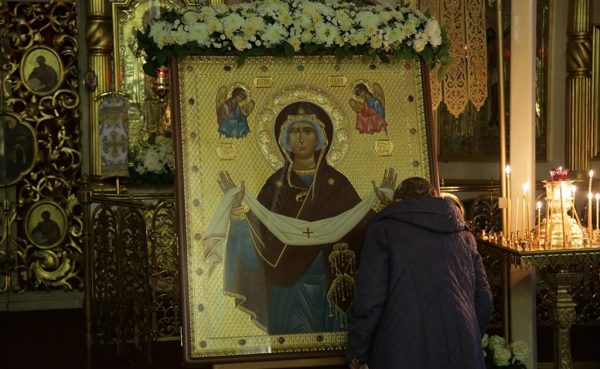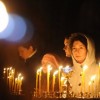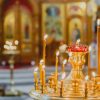In the name of the Father and of the Son and of the Holy Spirit, amen. Amen.
It is wonderful to gather on a day, not only to celebrate a local feast, for we have this altar dedicated to the Protection or the Protecting Veil of the Theotokos. But to gather together, even with the theme these days, it struck me for protection that we are gathering together here in the church with a hope and with the anticipation of being protected by God, by His saints, by His holy Mother, specifically today.
And in the miracle, the miraculous vision of the Theotokos appearing in the church of Blachernae outside of the city of Constantinople in the 900s, the very first thing we have to remember that had occurred before that miracle happened, is that the people were gathered in church. We always want to be wide in our vision of how God acts. We don’t ever want to take a feast such as the feast today, of the Protecting Veil of the Theotokos and simply assume that the Mother of God is all the time protecting us, and there’s nothing for us to do. The truth is that God is always waiting, and the saints are always waiting. His holy Mother is always waiting for us to create the opportunity for God to act, and for His will to be done.
God is a relational God and His saints are relational. He is always waiting for us to open the opportunity, as we know in his description of Himself standing at the door and knocking, not opening the door, I always remind people that in the icon of God, of Christ, standing at the door and knocking, there’s no door knob on the outside of the door.
He can’t open it. As God, of course he can, but in his relationship with us, he doesn’t open the door. We have to open the door. And so, even when celebrating this feast of this vision of the Theotokos protecting us, we have to remember that the people of Constantinople at the time, first of all, voluntarily in faith, gathered in the church to pray, to be in relationship with God and his holy Mother. That was the setting or that was the catalyst for the miraculous event.
The Theotokos, to make it obvious, did not appear in the church spreading out her protecting veil when no one was there. She did it because they came, and they were praying, and they were asking God to be in their lives to protect them. And then we see her responding to those prayers of the people by reassuring them through a miraculous vision that yes, not only was God working for their protection, but she also as the mother of the Christ, was working to protect the people and to beseech her son that they would be protected.
It’s always important too, to me, on this feast day to remind people that when we talk about the protecting veil of the Theotokos and Western society, when we talk about a woman’s veil, at least me, I think that this very nice little thin airy thing that doesn’t have much use other than to make her look more beautiful than she already is, right? And yet that is not what the veil of the Theotokos is. The word for it really, which we don’t have in English is cerement. The other one, in Slavonic I think, is Skeepi. I was pointing to our one Russian, but she didn’t see me.
The veil of the Theotokos is this piece of garment that is very big and it’s heavy. It’s thick. It is most often seen in the icons of the Mother of God. Here she is spreading it out, but technically it’s actually, it is this red, the red veil that she’s wearing around her body. She took it off and she spread it out over the people. It’s a big and thick garment. I think in English we probably would… it would be better, it’s not very pretty, but it’d be better to call it the poncho of the Theotokos. We know what that is, right? It’s this big square piece of material, and we use it for different things. And at the time, a cerement was used most often to wrap around your body to stay warm, but it also was used like a tent.
If it started raining, you would figure out how to put it up, put a string out and put the blanket over it so that you could be under it and the rain would not fall on you. In battle, it was wrapped around the arm. Not your sword arm, but your protecting arm, and that layers of material would be used as a shield. You would literally take blows on that arm wrapped with the cerements as a shield.
And so, it’s even in the idea of the garment that it is not something that is weak and pretty, it is something that is heavy and powerful. It’s a barrier against things, against threats, against rain, against blows, against the cold. And when we think of protection, it’s so important these days, particularly now in our nation, this idea of protection.
What is protection? What does it mean to be safe? We hear all the time about safe spaces and people feeling safe and everything like that. And the impression that’s made on me, at least, is that people think these days that safety is synonymous with isolation. If I isolate myself enough, I’ll finally be safe.
When I get away from the people who think poorly about me. When I get away from anybody who disagrees with me, when I get away from whatever the threats are, when I get away from whatever upsets me emotionally, then I’ll finally be safe. And we even have people who in their home alone build a room, right, that no one else can get in. And inside there there’s food and there’s everything that they might need. And if a threat comes, they run into this little tiny room and they lock the doors and they’re in there by themselves, and that’s safety. That’s safety.
In my world, you’re actually just stuck in a house that’s going to be burnt down or something, you know? And when we look around and we look at what God means by being protected, what the Theotokos is doing in order to protect us, there are two things that happen.
First of all, as I’ve already mentioned, we’re not alone. We’re not alone when we’re safe. Spiritually speaking, the worst place we can be possibly is alone, because then we’re stuck with ourselves. Everything that we do that is wrong is there. All of our weaknesses are present and dominant. There’s no one there to tell us what we’re doing is wrong. There’s no one to encourage us when we’re doing the right thing.
In order to be safe, as scripture tells us, there is safety in a multitude of counselors, a multitude, not a few. When we are together in one place, like the people gathered in the church of Blachernae, it is what brings God into our life. It’s what brings the activities of the saints and the Mother of God into our life. It’s what creates the opportunity for them to be there. We are not safe when we are alone.
If you look out in nature, one of the wonderful things that we see out there that proves this point is herds and flocks. Animals know it’s better to be in a big group. If you’re alone and the lions show up, they’re coming after you, guaranteed. They’re all going to be chasing you. When you’re in a herd and when you look at the way that herds work, the animals take turns moving towards the center of the herd where it’s the safest, and taking turns being on the outside of the herd where you are actually creating a barrier for your friends – you’re the barrier.
You’re on the outside of the herd and when the lions show up, the odds are a lot more likely on the outside edge of the herd, you’re going to be taken. And they know that, so they rotate through who gets to be in the middle where it’s safest, and who has to be on the outside once in a while in order to take the risk of being the barrier for the others.
In flocks of birds you see the same thing when there’s a great flock of birds and the hawk or the falcon comes along. When there’s a great crowd of birds, the odds of it being you that gets taken is very low. If you’re alone, they’re all coming after you. The most dangerous place we see in the spiritual life, the examples that we get, particularly from the monastic life of the most dangerous place to be, is in a little cave in the desert alone.
Out of all the monastics in the world, very, very few of them were ever called to be alone in the desert. Because when we’re alone, all the demons are coming after us. Us. Some are called to that life, but not very many of them. So, when we are truly safe and truly protected, we are never alone. We’re always with the people that are with us.
The second aspect of true safety or true protection is there’s a barrier around us. There is a wall around the fortress. There is a hedge around the vineyard. And even in that parable of Christ where the owner plants a vineyard and puts a hedge around it, it’s not an English decorative hedge that looks nice for the neighbors, very politely defines where the property line is. That’s not it. It’s actually a barrier of plants that at the time, was woven. The plants were actually woven together so tightly as they grew that even rabbits couldn’t get through it. It was a wall, a living wall. So we are not alone, and we have a barrier between us and the threat that is out there.
In the story of the Mother of God appearing, spreading her protecting veil, the cerement, over the people she is literally, openly, to Saint Andrew the Fool for Christ who saw the vision, She is spreading it out to create a barrier between the people and the enemies visible and invisible, it says.
There’s a wall around us. We’re protected when we are inside the fortress. And it’s interesting, I love these just reality checks- when you’re inside the fortress and you close the doors, the enemy’s on the outside, does everybody that’s on the inside, are they all getting along?
Not a prerequisite for being protected, for having safety. If you watch any really good historic movies, when you’re inside the fortress, it’s usually chaos, right? You’re fighting about what should be done, what should we do with the supplies? Who’s going to be in charge? There’s always this crazy chaos going on, but there is this incredible clarity between who are the good guys and who are the bad guys.
And that’s all we are striving for in our Christian understanding of being protected and being safe. We want to be with the people that are inside the fortress of the church. And quite honestly, we don’t care if we don’t get along all the time. That is something we should very naturally work on sacrificing, because it’s not us getting along in the church that separates us from the world. It’s us being in the church together, being inside these walls that are provided for us.
So, remember always that we can be protected by God and the saints and his holy Mother. We can, but they are going to do it after we gather together voluntarily after we ask them to protect us, and after we accept, truly accept in the way that we think and the way that we live, that in order to be protected by God, we have to gather together in the church whether we get along or not.
And we have to realize that there is a barrier that is separating us from the world. We’re not afraid of the world at all. We already won. We create a barrier so that it would be clear to us who the enemies are, visible and invisible. False teachings versus truth, the real God versus all of the false gods that are out there.
We don’t build a barrier because we are afraid. We build a barrier so once you enter through that wall into the Holy of Holies, you are in the true place with the true God.
In the name of the Father and of the Son and of the Holy Spirit. Amen.

















